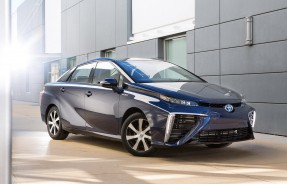A modest sales target of 700 units worldwide in 2015. Global production volume is expected to rise to tens of thousands by the 2020s. On the road, the Mirai is a more inspiring proposition. Powered by a 114kW fuel cell stack and a 113kW motor, the Mirai can accelerate from 0 to 100km/h in just under 10 seconds. Channelling power through a CVT, the four-door makes reasonable progress. But then again, Toyota has had more than 17 years to get its electric powertrain together, and yes, to economise, the Mirai does dig deeply into the Prius’s parts bin for its motor, inverter, power control unit and battery pack. That all helps to keep this fuel cell sedan well under $100,000.
From its two hydrogen tanks, Toyota claims the Mirai has a range of 650kms, although one source put that distance at more like 550kms in the real world.
Like the exterior, the Mirai’s interior design is highly expressive and unusual, centralizing the gauges up by the windshield, à la Prius, and arranging secondary controls on intersecting planes that swoosh across the cabin. As is becoming the trend these days, many of the controls are of the capacitive-touch variety. Hopefully, Toyota will at least throw in a microfiber wipe cloth to deal with the copious fingerprints, as does Cadillac with its CUE-equipped products.
Like BEVs, fuel-cell vehicles are heavy, and the Mirai is said to weigh in at a hefty 4079 pounds—nearly 600 more than a dimensionally similar Camry hybrid—despite the use of carbon fiber for the storage tanks.
Price: $57,500 in the US and €66,000 in Europe
producer: toyota
period: 2016










